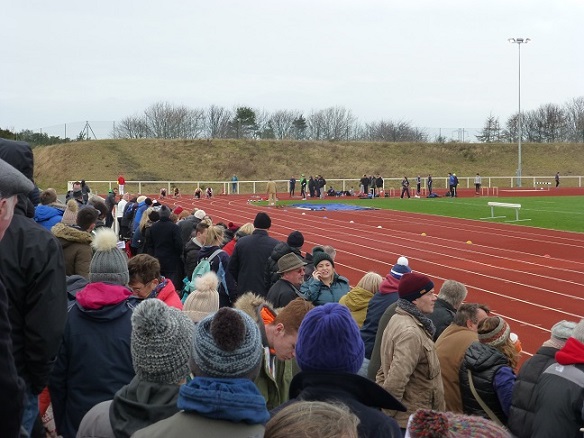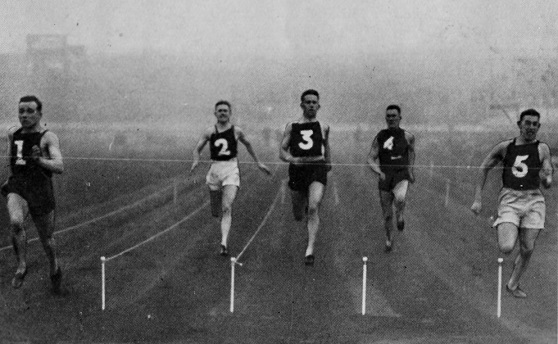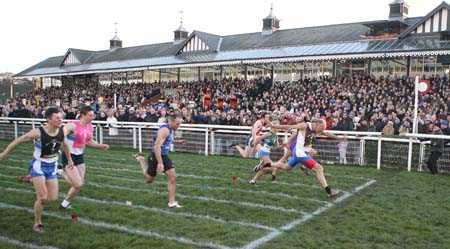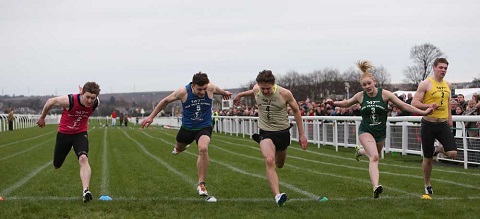New Year Sprint - About
The New Year Sprint is the most enduring open athletics event in the UK. A handicap race held over 110 metres, the Sprint has been staged in Scotland on or around New Year's Day annually since 1870. Competitors vie for a first prize of thousands of pounds.
Supporting Events
The 110 metres New Year Sprint is traditionally supported by Open events up to 800 metres and Veterans and Ladies races over 90 metres. Youths events are generally held over 90 metres, 200 metres and 800 metres. All events feature a handicap starting system.
Venue
The 155th New Year Sprint is hosted by Grangemouth Stadium for the first time in the meeting's long history.
Musselburgh Racecourse, 6 miles east of Edinburgh, had been the established home of the final rounds of the New Year Sprint since the turn of the century, with COVID-hit years of 2020 and 2021 being the only exceptions. The racing took place in front of the Old Grandstand which was packed with race-goers for the New Year's Day horse racing fixture.
The first day's racing was also held at Musselburgh Racecourse until the 147th in 2016 when the action moved to the East Lothian Athletics Arena in Prestonpans where it stayed for 6 years.
The new Meadowbank Stadium hosted both days of the meeting for the 153rd in 2022 and the first day for the following year.

On their marks at East Lothian Athletics Arena
Race of Champions
The New Year Sprint has attracted top-flight domestic and foreign runners throughout its history. Most recently, 1995 winner Doug Walker, went on to become European 200m champion. 1987 winner Bill Snoddy (U.S.A.) was formerly the world's fastest man (wind assisted) and World Professional Record holder over 120yds, George McNeill, won in 1970. Sprinters such as Willie McFarlane of Glasgow (1930s) and A. R. Downer of Edinburgh (1890s), who are considered the finest of their generation, also graced the event with superlative performances.

Willie McFarlane (left) winning the 65th New Year Sprint off scratch, in 1934
Race for All
The Sprint is more than just a battle between the fleetest of foot. For this event features a handicap starting system designed to ensure that any runner, no matter what their ability, age or sex, has a chance of scooping the big first prize. Victories by veteran Tony Bowman, the 138th winner in 2007 and Jazmine Tomlinson and Molly Reville, the 147th and 152nd winners in 2016 and 2021, bear witness to this.

71 year old Tony Bowman winning the 138th New Year Sprint off 28.5m, in December 2006.

Jazmine Tomlinson becoming the first ever female New Year Sprint winner, at the 147th in January 2016.
Mystical Air
The longevity of the Sprint, the participation of champion runners, the prospect of a front marker clinging on for victory and the determination of all runners competing at the most inhospitable time of year are all ingredients that lend the Sprint an almost mystical air.
Scottish Athletics
The New Year Sprint meeting has been licensed by Scottish Athletics, the national governing body for athletics in Scotland. Amateur athletes may keep any prize money won.
Borders Athletics
The flavour of the programme of events at the New Year Sprint meeting has much in common with the traditional games and sports held in the Scottish Borders which are run under the auspices of Borders Athletics.
About the handicap starting system
A number of sports feature handicap systems enabling competitors of varying ability to compete on an equal footing. In horse racing, slower horses carry less weight and in golf a less able golfer will have a bigger stroke advantage.
Traditionally in foot racing, a slower runner is given an advantage by starting up the field. Each runner's start, or handicap, is assigned by the handicapper of the meeting. A runner's handicap is usually dependent on their past performances and as well as the handicapper's assessment of the runner's ability. Past performances include placings and starts in handicap events and recorded times in scratch races (both professional and amateur). Where a runner reports no past performances they usually receive a "novice's" mark.
The photo below of the start of the 2002 New Year Sprint final shows a wide spread of starts, although the camera angle makes it more difficult to assess the relative positions. Veteran J. Beattie in lane 1 (lane 1 is nearest the camera) is the front marker with a 26m start, Karen Steede in lane 7 is second front marker with a 21.5m start with Sharon Wilson in lane 5 just behind on 20.5m. Starting at the back is C. Telford (in black) on 6.75m in lane 3 with R. Linnet to his right slightly forward at 7.25m and C. Sowerby on Telford's left on 9.5m.

A runner allocated a 0m start runs off "scratch". There was no scratch runner in the 2002 New Year Sprint - the backmarker in the event was D. Ladejo on 3m - the "virtual scratch" mark.
The Year
The very first New Year Sprint meeting, in 1870, was held over three days, starting on new year's day. This pattern of starting on 1st January, or occasionally 2nd January, continued right up to the 98th edition which was staged on 31st December 1966 and 2nd January 1967, thus starting in the old year and finishing in the new year. The following edition followed suit, being held on 30th December 1967 and 1st January 1968. Normal service was resumed until the 125th edition, which was held on 30th - 31st December 1993. This pattern of holding the meeting just before new year or starting the meeting in the old year and finishing in the new year has continued ever since.
Ambiguity can arise when using a year to refer to a meeting that is held in the old year, or that straddles a year. The convention adopted when referring to a particular edition by year, is to use the year for which new year's day lands nearest, e.g. the 140th New Year Sprint meeting held on 28th and 29th December 2008 is assigned to 2009. The exceptions to this rule are the 152nd and 153rd meetings which were both delayed from their original January dates; the 152nd was delayed by COVID-19 and the 153rd due to the wait for completion of the new Meadowbank Sports Complex. The 152nd was held in July 2021 but is assigned to 2021 and the 153rd was held in July 2022 but is assigned to 2022.